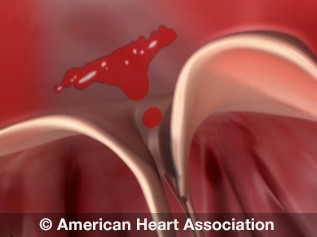Problem: Mitral Valve Regurgitation
What's mitral valve regurgitation?
Mitral regurgitation is leakage of blood backward through the mitral valve each time the left ventricle contracts.
A leaking mitral valve allows blood to flow in two directions during the contraction. Some blood flows from the left ventricle through the aortic valve — as it should — and some blood flows back into the left atrium.
Watch an animation of mitral valve regurgitation.

What's the problem that results from mitral regurgitation?
Leakage can increase blood volume and pressure in the left atrium. The increased pressure can increase pressure in the veins leading from the lungs to the heart (pulmonary veins).
If regurgitation is severe, increased pressure may result in congestion (or fluid buildup) in the lungs.
What are the symptoms of mitral valve regurgitation?
Mild mitral regurgitation often does not have any symptoms.
Most symptoms occur gradually and may include coughing, exhaustion, lightheadedness, increased urination at night, rapid breathing or palpitations. As symptoms progress you may have increased shortness of breath with activity, or when lying flat. You also may start waking up more frequently after falling asleep due to breathing trouble.
What conditions may be related to mitral regurgitation?
The left atrium tends to enlarge due to the extra blood volume leaking back from the ventricle. An enlarged atrium may develop a rapid and disorganized movement, known as atrial fibrillation, which reduces the heart’s ability to pump efficiently.
A fibrillating atrium quivers and doesn’t pump efficiently, which increases the risk for blood clots that may cause a stroke.
Another potential complication of mitral regurgitation is pulmonary hypertension.
Treatment for mild mitral regurgitation may include anticoagulation medication. However, surgery to repair or replace is often needed.





